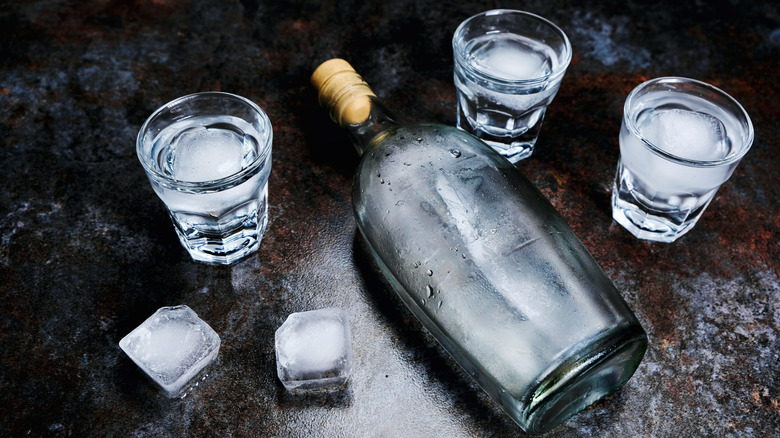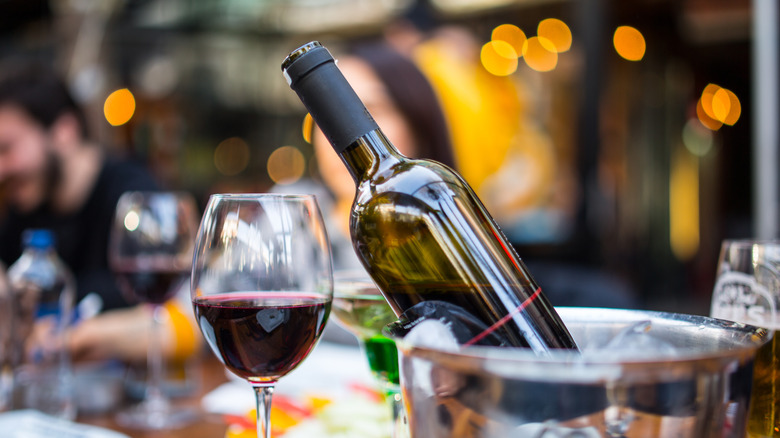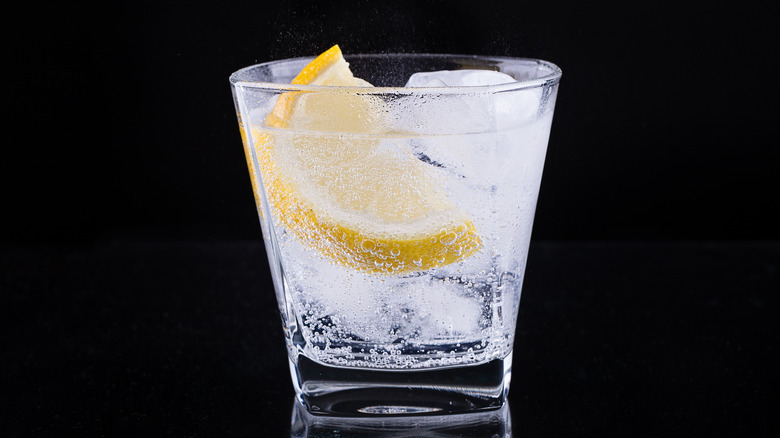The Scientific Reason Liquor Does Not Solidify In Your Freezer
It's like a little magic trick. You put your bottle of vodka in the freezer and voila! In a few hours you will have a bottle of thick, perfectly chilled liquor, ready for an ice cold martini or refreshing vodka soda, all without pesky ice floes or bursting bottles. It's common knowledge that vodka (and other liquors) don't freeze in standard home freezers. Though it may seem like sorcery, the reason that your bottle of liquor won't freeze when put in your freezer is actually quite simple (and scientific): Alcohol. To be more specific, ethanol. Alcoholic beverages such as liquor, wine, and beer all contain ethanol. The ingredient is what makes these drinks alcoholic, and it's also what makes liquor difficult to ice. While water has a freezing point of 32 degrees Fahrenheit, pure ethanol freezes at -173 degrees Fahrenheit, a temperature that no home freezer reaches.
Now, no liquor is pure alcohol (ethanol), so it doesn't sure the same freezing point as pure ethanol. But liquor's alcohol content typically hovers around 40% ABV, meaning that its freezing point will be much lower than non-alcoholic drinks or even beers and wines, which have a lower ABV. The freezing point of most liquors is around -17 degrees Fahrenheit, which is far below the range of your home freezer. Of course, this doesn't mean that popping your bottle of liquor into your ice tray won't have any effect on your alcohol. Freezing your liquor can impact your drink's taste and texture, adding thickness and dulling its taste, which are important factors to keep in mind when deciding whether or not to pop that bottle in the ice box.
Not all alcohols freeze the same
Now, this doesn't mean that you should pop your best Chardonnay into the ice box the night before a dinner party. After all, there is a pretty big difference between beverages such as wine and beer versus more alcoholic drinks like vodka or whiskey. Though wine and beer do contain alcohol, they also have a much higher water content, which makes them more likely to freeze when exposed to low temperatures. For example, a beer, ranging between 3% and 12% ABV, will freeze at about 28 degrees Fahrenheit. Similarly, wine, which typically has an ABV between 8% and 14%, will freeze at about 23 degrees Fahrenheit. This is far above the temperature of a typical home freezer.
Leaving your beer or wine in the freezer can result in slushy, icy mess. And that's the best case scenario. Freezing actually expands liquids, which means that freezing your beer or wine can cause it to burst, leaving you with popped cans or even a cracked wine bottle. Additionally, many wines and beers have some level of carbonation, making them more likely to expand, and explode, in the freezer. This can not only be inconvenient, but also dangerous. So you might want to consider alternate chilling methods for these drinks (say, an ice bucket or a long rest in the fridge).
When to freeze your liquor, and when to leave it out
Even though liquors won't freeze up like wine and beer do, it doesn't mean that you should move your entire liquor collection into your freezer. This is because, in addition to cooling your drink, low temperatures can actually alter the way your drink tastes. In fact, freezing your drinks can dampen their flavor. When it comes to liquors like vodka, this isn't that much of an issue, as it has a more neutral taste. If anything, freezing your vodka can help temper the strong alcoholic taste. However, the same things that make freezing such an appealing choice for vodka, also makes it a nonstarter for other liquors.
Drinks such as whiskey or tequila, which have more flavor, are dulled at cold temperatures. Whiskey, in particular, contains volatile organic compounds which are developed as whiskey ages, and they are made less pungent when your alcohol is put in the freezer. This can prevent you from fully enjoying the complexity of your drink. If you want cold whiskey without loss of flavor, you can try whiskey stones. Either way, the world is your ice box, and you are free to freeze whichever liquor you'd like — just be prepared for the possible impact on taste. And if you're a true martini aficionado, you'll want to tuck that vodka into your freezer before you shake or stir up a batch of that classic cocktail.


